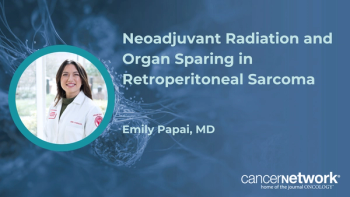
Real-World Evidence Reinforce Brexu-cel as Salvage Strategy in Mantle Cell Lymphoma
Patients with mantle cell lymphoma appeared to benefit from brexucabtagene autoleucel as salvage therapy in the real-world setting.
Based on real-world treatment data, brexucabtagene autoleucel (Brexu-cel; Tecartus) continues to be an acceptable salvage treatment strategy for patients with mantle cell lymphoma (MCL) and could be of particular benefit to those with high-risk features, according to a letter published in Blood Advances.1
Investigators included a higher-risk population compared with the phase 2 ZUMA-2 trial (NCT02601313)—which supported approval of the CAR T-cell product in this setting2—and compared it with the real-world toxicity profile of brexu-cel. Notably, grade 3 or higher cytokine release syndrome (CRS) was less frequent with delayed onset in the real-world study compared with the pivotal trial. However, investigators noted that fatal events were more likely to occur on their study at 15% vs 3% in the ZUMA-2 trial. They noted that selection bias could play a role in these outcomes, as well as the longer turnaround time included in a real-world setting.
Overall responses and complete responses (CRs) were similar between trials, although the 12-month progression-free survival and overall survival rates were slightly decreased in the real-world trial, which may be in part due to an increase in non-relapse mortality. Additionally, patients with an intermediate– or low-risk simplified MCL International Prognostic Index (s-MIPI) score had a longer PFS vs those with a high-risk score.
As notably little safety and efficacy data for brexu-cel have readout beyond the ZUMA-2 trial, investigators gathered real-world data from the European Early Access Program that allowed patients with relapsed/refractory MCL to undergo treatment with brexu-cel.
In the real-world study, a total of 39 patients underwent apheresis for brexu-cel. Of these patients, 8% experienced an initial manufacturing failure that necessitated a second or third apheresis to create the product. Two of these 3 patients did manage to receive an infusion. Among those who enrolled, 85% received brexu-cel infusions, and the remaining patients were unable to because of progressive disease, achieving a CR after bridging therapy, or infection.
The median patient age was 67 years, and most patients had a high-risk s-MIPI score at apheresis (55%) and advanced disease (88%). Thirty-six percent of patients had previously received autologous hematopoietic cell transplantation. Additionally, 24% of patients had blastoid morphology and 12% had TP53 mutations. The median follow-up post–brexu-cel infusion was 10.1 months.
In total, 26 patients received 1 bridging regimen and 6 received 2 following apheresis, with common bridging therapies including chemotherapy (n = 14) and ibrutinib (Imbruvica; n = 12). Following bridging therapy, 6% of patients achieved a CR, 16% had a partial response, 22% experienced stable disease, and 56% had progressive disease.
Although they acknowledged that brexu-cel appeared to be an effective salvage regimen in this patient population, they stated that the incidence of severe adverse effects was a point of concern and warrants further investigation.
References
- Iacoboni G, Rejeski K, Villacampa G, et al. Real-world evidence of brexucabtagene autoleucel for the treatment of relapsed or refractory mantle cell lymphoma. Blood Adv. Published online March 10, 2022. doi:10.1182/bloodadvances.2021006922
- FDA approves brexucabtagene autoleucel for relapsed or refractory mantle cell lymphoma. FDA. July 24, 2020. Accessed March 21, 2022. https://bit.ly/3qmdVDD
Newsletter
Stay up to date on recent advances in the multidisciplinary approach to cancer.







































